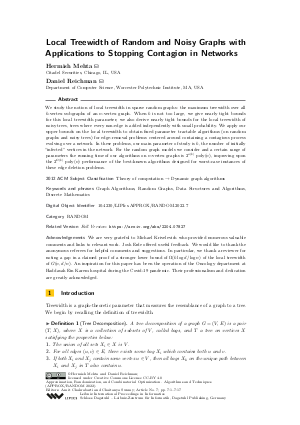@InProceedings{mehta_et_al:LIPIcs.APPROX/RANDOM.2022.7,
author = {Mehta, Hermish and Reichman, Daniel},
title = {{Local Treewidth of Random and Noisy Graphs with Applications to Stopping Contagion in Networks}},
booktitle = {Approximation, Randomization, and Combinatorial Optimization. Algorithms and Techniques (APPROX/RANDOM 2022)},
pages = {7:1--7:17},
series = {Leibniz International Proceedings in Informatics (LIPIcs)},
ISBN = {978-3-95977-249-5},
ISSN = {1868-8969},
year = {2022},
volume = {245},
editor = {Chakrabarti, Amit and Swamy, Chaitanya},
publisher = {Schloss Dagstuhl -- Leibniz-Zentrum f{\"u}r Informatik},
address = {Dagstuhl, Germany},
URL = {https://drops.dagstuhl.de/entities/document/10.4230/LIPIcs.APPROX/RANDOM.2022.7},
URN = {urn:nbn:de:0030-drops-171299},
doi = {10.4230/LIPIcs.APPROX/RANDOM.2022.7},
annote = {Keywords: Graph Algorithms, Random Graphs, Data Structures and Algorithms, Discrete Mathematics}
}

 Creative Commons Attribution 4.0 International license
Creative Commons Attribution 4.0 International license











































